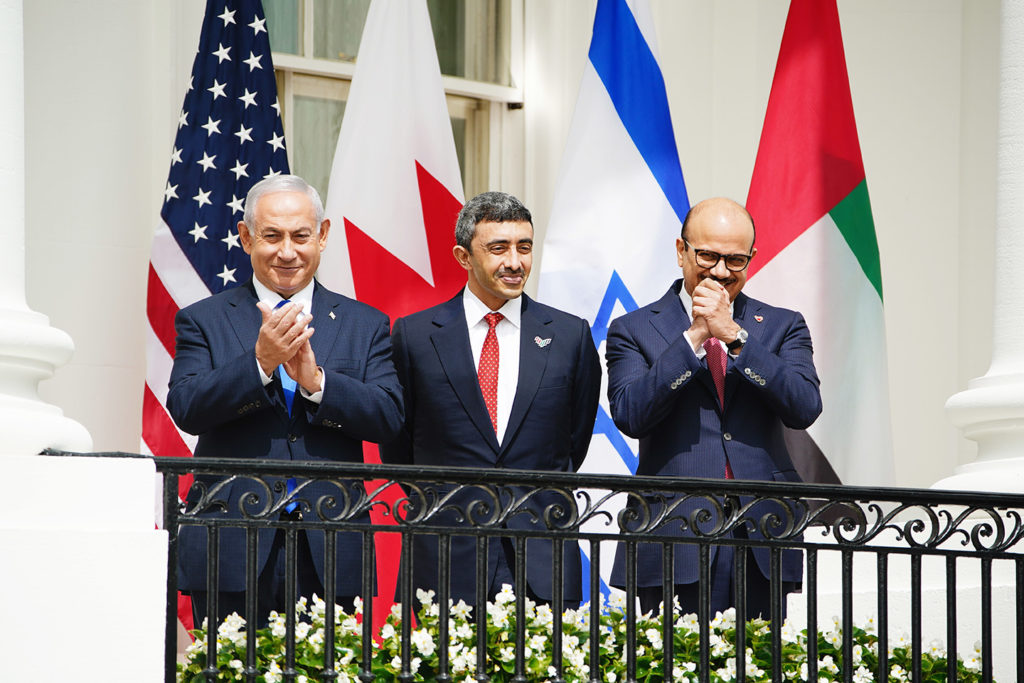IN THE MEDIA
A year into the Abraham Accords shines a light into future
September 20, 2021 | Colin Rubenstein

Sydney Morning Herald online – September 19, 2021
The Middle East, so often in the news for its problems, has, during the past year, pioneered a major historic breakthrough likely to have enduring effects, in the form of the Abraham Accords.
These US-brokered normalisation agreements between Israel, the United Arab Emirates and Bahrain were signed at the White House on September 15, 2020, and later joined by Sudan in October and Morocco in December.
Significantly Oman and Saudi Arabia have supported the Accords in word, deed or both, and are widely considered likely to formally join them at some point.
The path-breaking Accords displayed a pragmatic coming together of key regional players keen to overcome what divides them and focus on those common interests which unite them.
Over the past year, these agreements have shown themselves to be resilient and enduring, surviving not only changes of government in both Washington and Jerusalem, but also the testing war between Hamas and Israel in May.
Israel has long been isolated from its Arab neighbours. Since 1948, when Israel was established in the wake of the 1947 United Nations partition plan, the Arab League has boycotted Israel. This has extended beyond economic matters to incorporate travel bans and a halt on any kind diplomatic relations between Israel and its neighbours. The frigidity of the relationship was so all-encompassing that Arab countries even blocked calls to Israeli phone numbers.
Israel did sign important peace agreements with its neighbours Egypt and Jordan in 1979 and 1994 respectively. These, however, have proved to be somewhat limited agreements that, while critically eliminating direct conflict, have been confined to a “cold peace”, with Amman and Cairo discouraging “people-to-people” contacts and genuine normalisation of relations.
In contrast, the growing warmth of the extensive relationships between Israel, the UAE and Bahrain – and increasingly Morocco and Sudan – is evident.
One of the first barriers to fall was direct telephone links, which were initiated in August 2020, ahead of the signing of the Abraham Accords.
Soon after, the first direct flights left Tel Aviv for Dubai. Images of Emirati men in the traditional white kandura and gutra waving to an El Al airplane with a Star of David on its tail were a striking representation of the change.
Those flights – now regular – are even more remarkable for the fact that they travel through Saudi Arabia’s airspace. The granting of overflight is yet another sign of a thawing of relations between Israel and Saudi Arabia under the influence of Crown Prince Mohamed Bin Salman.
Economic ties have also been quick to develop. Israel’s Central Bureau of Statistics cited a 234 per cent increase in trade between Israel and its Middle East and North African neighbours in the first seven months of 2021. Abu Dhabi’s Mudbala Petroleum Company has just signed a deal to invest $US1.1 billion in an Israeli natural gas project, an investment that would have been previously unthinkable.
But arguably most important are the “people-to-people” links. A significant aspect of the Abraham Accords is the recognition of the need to promote interfaith and intercultural dialogue between the adherents of the three Abrahamic religions: Judaism, Islam and Christianity.
This development has even spread to Australia, where dialogue between Jewish organisations, AIJAC included, and Emirati and Moroccan diplomats has been frequent and warm.
The Biden administration, which for the most part has distanced itself from much of the foreign policy of the Trump administration, has gradually but wisely embraced the Abraham Accords and now seems committed to work towards expanding the circle of nations that subscribe to them.
It’s an effort that, today more than ever, is strongly in America’s interests and those of like-minded European and Western powers, including Australia. It provides a potential answer for these Abraham Accords members to the new threatening balance of power emerging in this strategic region.
Aggressive destablising actors such as Iran, but also Turkey, have been further encouraged and potentially empowered by the chaotic and damaging nature of the US withdrawal from Afghanistan and the immediate Taliban takeover, as well as the policy of successive recent US Presidents to militarily withdraw from the Middle East, leaving behind power vacuums.
The likely effect of US President Biden’s approach to the Middle East will be to incentivise moderate actors to continue to band together to defend themselves against the emerging threats, including those posed by Iran, Turkey and the Taliban.
As the UAE, Bahrain, Sudan and Morocco have already recognised, Israel is an essential member of any such alliance – possessing not only the region’s strongest military, but also able to offer economic, technological, environmental and intelligence assistance to regimes seeking to survive in an increasingly dangerous region.
A year into the Abraham Accords, so much has been accomplished, and the promise for further positive achievements is a shining light in what is so often seen as a troubled region.
Dr Colin Rubenstein is executive director of the Australia/Israel & Jewish Affairs Council.
Tags: Abraham Accords, Israel, Middle East





